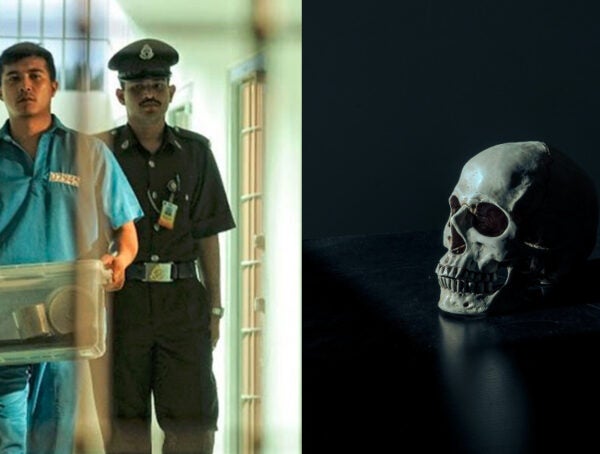Disclaimer: In Real Life is a platform for everyday people to share their experiences and voices. All articles are personal stories and do not necessarily echo In Real Life’s sentiments.
Malaysia prides itself on its multiculturalism and the diversity of its residents, but discussion of diversity is usually limited to the three big ethnic groups of Malay, Chinese and Indian.
But Malaysia isn’t just made up of 3 races. In fact there are hundreds of different ethnic groups here!
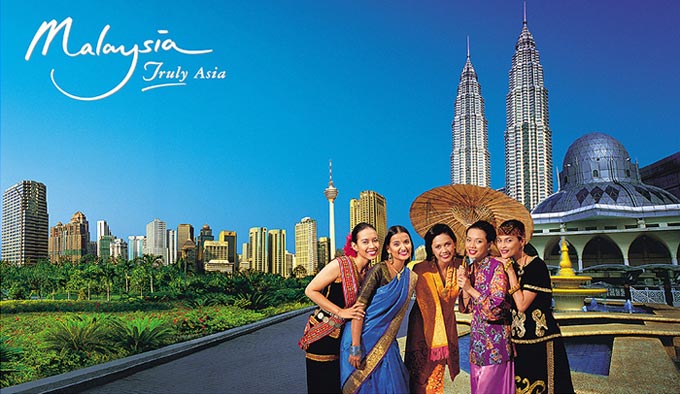
The Malaysian method of categorising races stems from the colonial era. The lain-lain race category is used for everyone who isn’t already categorised as Malay, Chinese or Indian. Funnily enough, Orang Asli are also considered lain-lain, a category shared with a diverse number of other races such as Punjabi and Serani people (descendants of European colonisers who may sometimes go by the label “Eurasian” – the largest group within this ethnicity is the Portuguese Serani).
Estimates place the total of the population categorised as lain-lain at a mere 0.7 – 1% of the whole of Malaysia. Although it sounds like a tiny number of people, it is the ethnic group around 300,000 Malaysians belong to. You’ve probably met many lain-lain people, maybe without even realising.
Growing up in an ethnic category marked as “others” does mean that your experience differs a lot from those who belong to the larger ethnic groups. These are some of the struggles that being lain-lain will force you into:
1. Nobody knows what your ethnicity is
“Uh actually ah… What are you?”
If you’re lain-lain, you’ve heard this question way too many times. That is, if someone hasn’t assumed your ethnicity wrongly.
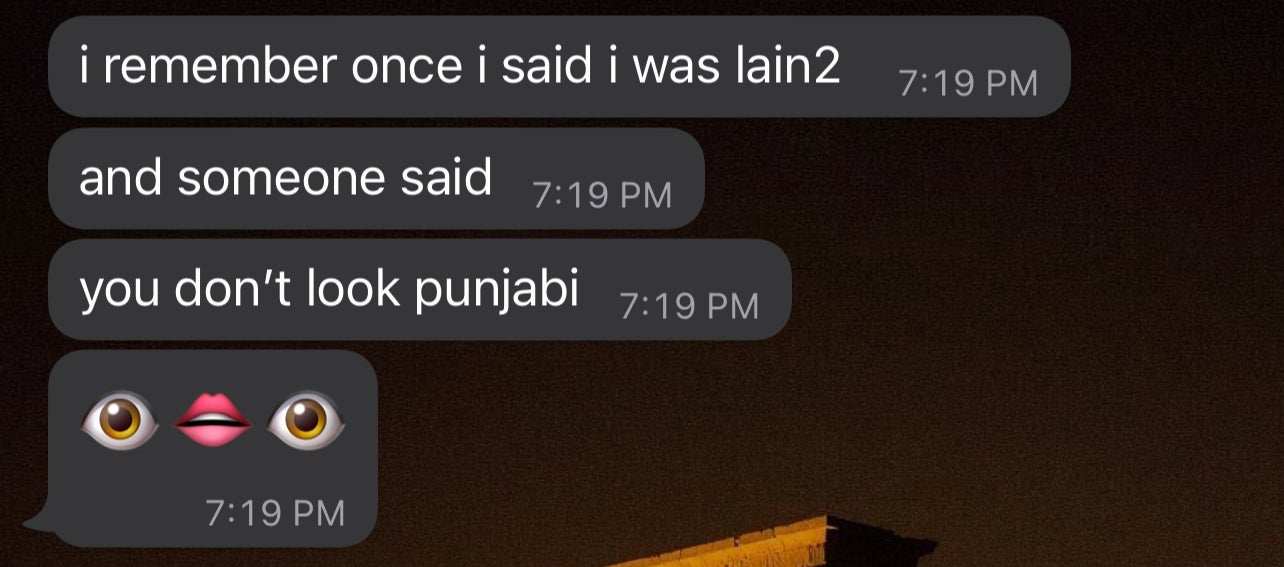
The only way Malaysians of the major ethnic groups can relate to you is by comparing you to the major groups: for example, people describe me as looking more Malay/Chinese while Raya, another Serani acquaintance, is often told she looks Chindian. However, Preet, a Punjabi, is straight up assumed to be foreign.
It’s frustrating because even within the spectrum of being Malay or Chinese or Indian, there is still a lot of diversity!
The only good thing about being so invisible is that you rarely experience racism based on your real race (because nobody can tell what it is at first glance) – however what happens instead is that you’re treated based on which major race you appear to resemble.
2. Also, nobody knows (or cares) about your culture
As for myself, I get this way too often: “Serani tu apa ye?” I don’t just get it from average people though, I also get it from policemen at roadblocks and all sorts of authority figures.
Malaysians from the major ethnic groups are very rarely aware of, let alone educated on, the minority races. While the three big race groups have holidays for their cultural events, nobody even knows what or when you’re celebrating when you’re a minority.
The best you can hope for is a small wave of awareness when someone from your ethnicity has a huge achievement that contributes to the nation, like representing Malaysia in the Miss Universe beauty pageants.
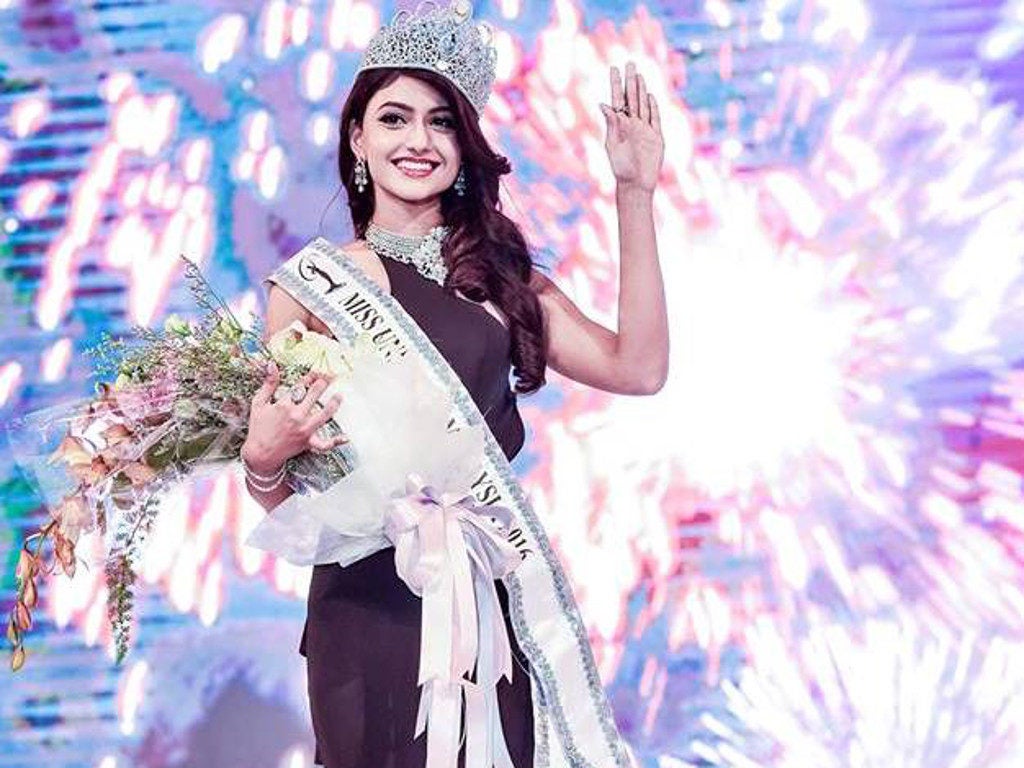
Preet confided in me that the Punjabi community had tried to start a conversation around making Vaisakhi a public holiday, but that there was a lack of authenticity from politicians.
“The most attention we would get is a politician showing up to our gurdwara with cameras, so I think my family and I have just learnt to settle.”
3. Everyone in West Malaysia thinks you’re from East Malaysia
While being embarrassingly wrong (some of us actually are born and bred in West Malaysia!), this also shows how ignorant the average Peninsular Malaysian is about our Borneon compatriots.
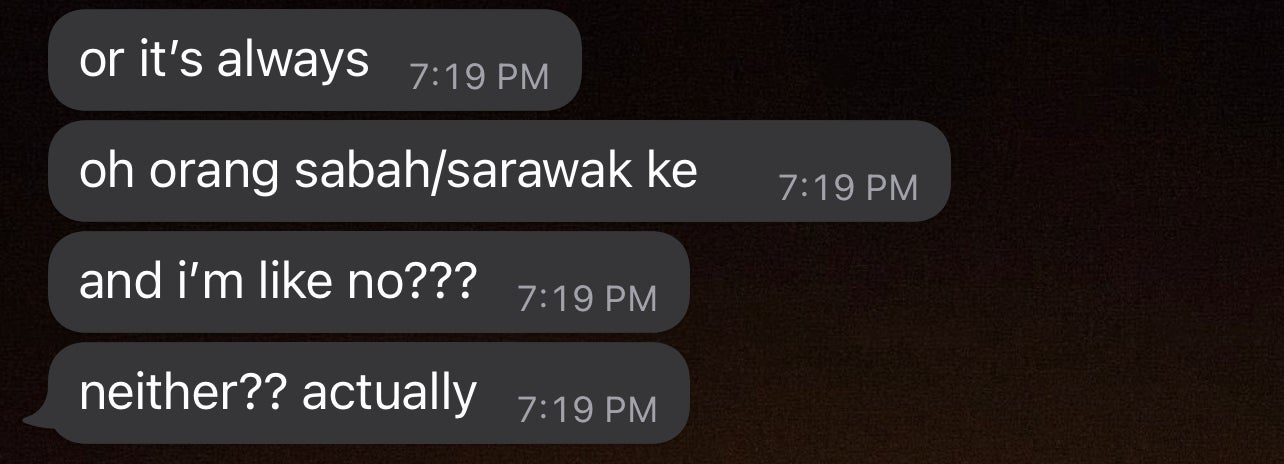
It seems to be the default assumption Malaysians make about minorities. It’s pretty sad because it feels like West Malaysians are so unaware of East Malaysia and ethnic minorities that anyone who doesn’t fit into certain boxes is assumed to be from East Malaysia.
4. Your identity is constantly invalidated
So you don’t just deal with people not knowing what you are, you also deal with people invalidating your ethnic identity.
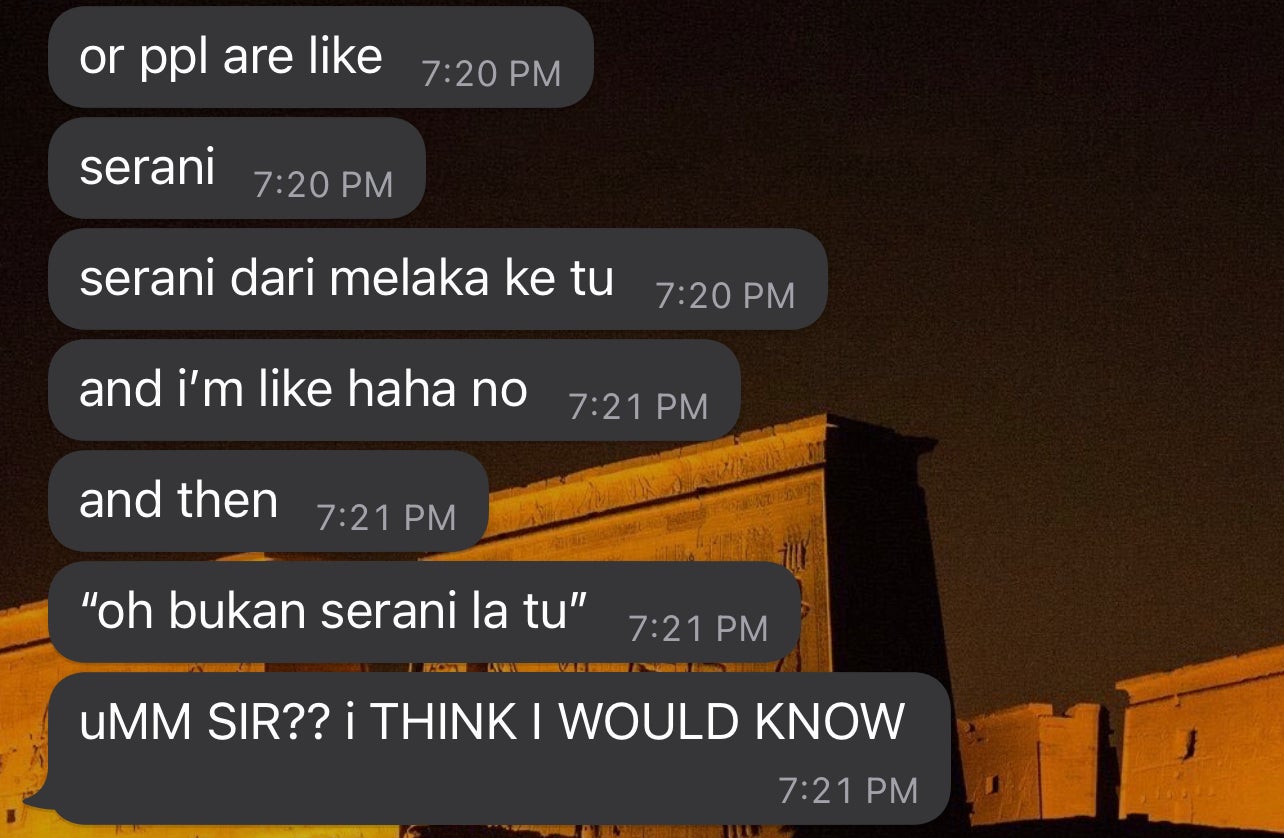
If you’re from a minority race that people have fortunately heard of, you still have to deal with people dismissing your identity because it doesn’t fit into their misconceptions.
Raya told me that she has given up on the lengthy explanation on her Serani roots, and that since people say that she looks Chindian due to her mixed race ancestry, she just tells people she’s Chindian when they ask.
5. You’re both too exotic and not exotic enough
So you’re an ethnic minority but you somehow resemble one of the major races?
Good luck, everyone will have an opinion about how you look and why you don’t look like what they expect.

Bad enough that they don’t even know what you actually are or anything about your culture, it’s worse that they’ll say things like, “oh you’re supposed to be (a minority race), how come you so dark, look like Indian only.”
And yeah, if you’re dark skinned, immediately you’ll be labelled with “Indian” like it’s an insult.
6. Being bullied for being different
Sandra, dark-skinned and half Filipina, had her classmates break her toys and rip up her books, while they laughed at her and called her a maid. This continued to secondary school, and even in tertiary education she found herself having to try very hard to be accepted socially.
When you belong to an ethnic minority, you don’t expect to find other people of the same ethnic group in your spaces – be it work or school. This means that you’ll feel socially alone. You don’t have the reassurance of someone from the same ethnicity as you to commiserate with.
Neither do you have anyone who will stand up for you.
7. Feeling isolated or outcased from general Malaysian society
From kopitiams naming themselves Ali, Muthu and Ah Hock to our history textbooks, you get used to never seeing yourself explicitly claimed as Malaysian.

Conversations about race inevitably center the three largest ethnic groups. Even Orang Asli are often tokenised.
You’ll always see people speaking out about the rights of Malays, Chinese and Indians, but if you belong to a comparatively obscure ethnic group?
You don’t even see yourself represented in Malaysian ads.

Although many of us who are lain-lain identify strongly as Malaysian, it can be disappointing to never see yourself counted as important just because you belong to a minor ethnic group.
Preet told me this: “People are shocked to realise we were born and bred here but you can tell that they don’t understand us to be citizens the way Malays, Chinese and Indian people are because they were never educated on our people and our culture, and they never tried learning either.”
Despite not being Punjabi, I found myself agreeing with her summary. The experience of being otherised was only natural, especially coming from an ethnic category literally named “others”.
The problem is that the lain-lain category is expected to hold too many different cultures.
Hundreds of ethnicities and cultures that make up the muhibbah society that Malaysia boasts of are all piled together in one place, when each one is distinct from the others.
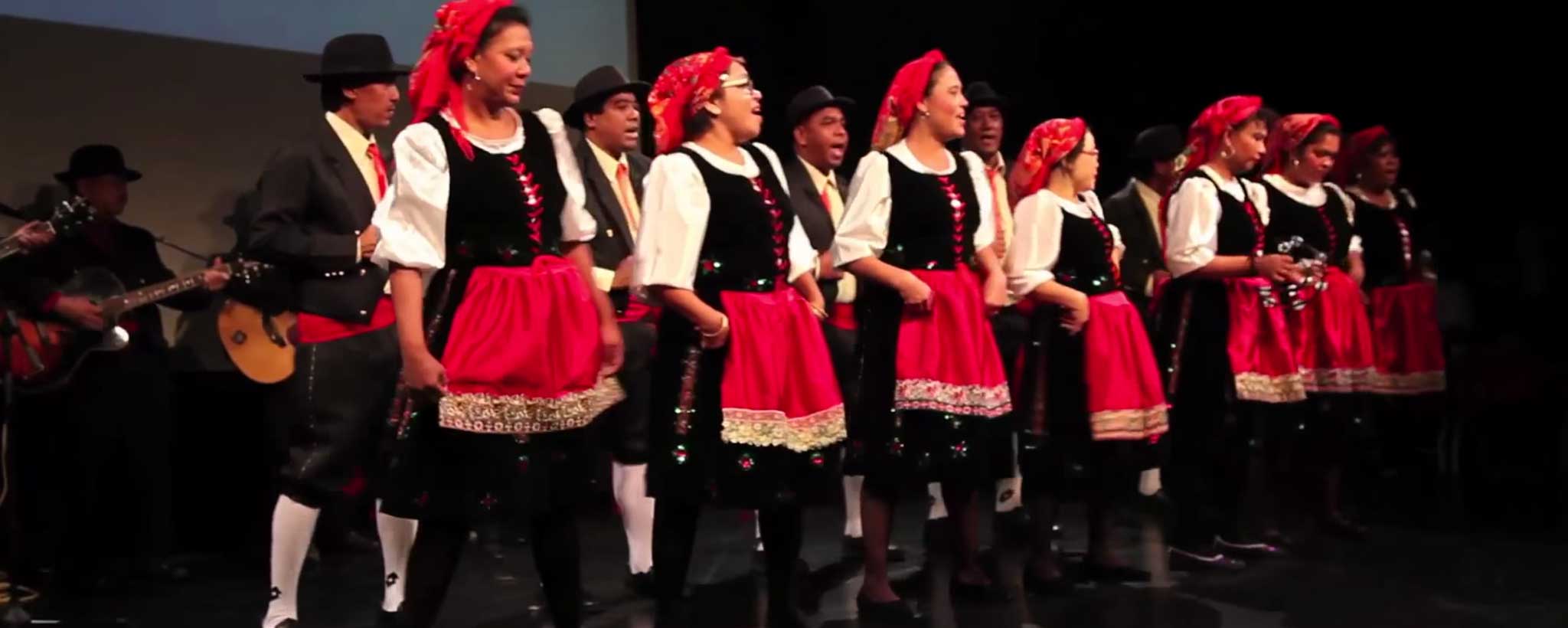
Malaysians who belong to the three large race categories also do not know much about these cultures, which contributes to lain-lain Malaysians feeling like we’re not truly seen by them as fellow Malaysians.
Preet said it very well: “It feels weird belonging to the lain-lain category because for some reason, it made people believe that I wasn’t Malaysian enough.
“Although they didn’t say it, I could feel them thinking – this is a family of different people with different roots, even though that should be something that is celebrated, especially here in Malaysia.”
But then again, it’s hard to celebrate people when you don’t know they exist.
For more stories like this, read: 5 Malaysian Indians Reveal The Struggles They Face and I’m A Bangladeshi Who’s Lived In Malaysia For Over 20 Years. Here’s What I Wish Malaysians Knew.
You might also like
More from Real People
‘A RM100 fee cost a company 5 years of revenue’ shares M’sian
This story is about a Malaysian who learned that bureaucracy can be defeated simply by not arguing with it.A billing …
‘I quiet-quit, upskilled, and tripled my salary,’ shares M’sian engineer
This story is about a Malaysian who learned that loyalty without leverage leads nowhere in the corporate world.After years of …
‘I did everything right, and it still wasn’t enough’ shares M’sian graduate
This story is about a Malaysian graduate navigating big dreams in a job market where a degree no longer guarantees …






